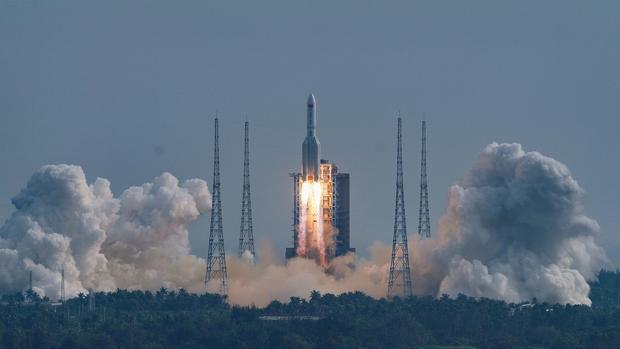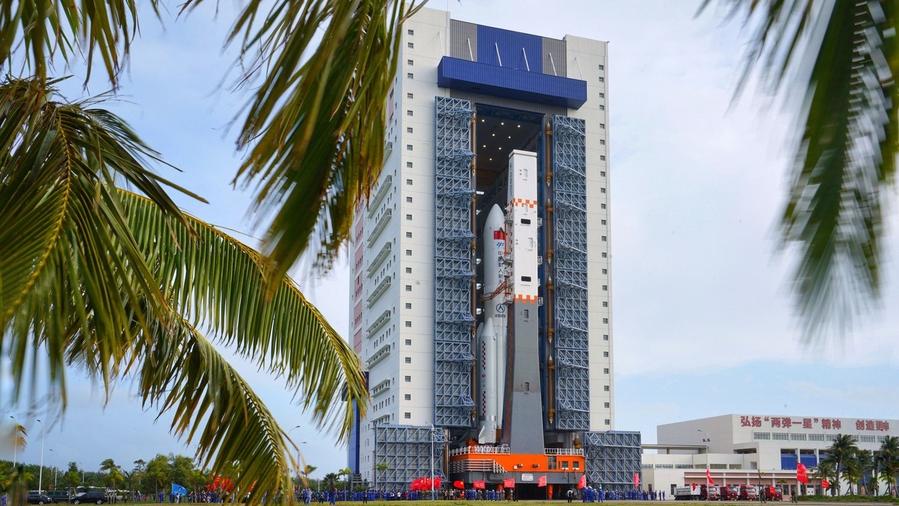 China's Mengtian space lab module is launched at the Wenchang Space Launch Center in the southernmost island province of Hainan, Oct 31, 2022. (SU DONG / FOR CHINADAILY.COM.CN)
China's Mengtian space lab module is launched at the Wenchang Space Launch Center in the southernmost island province of Hainan, Oct 31, 2022. (SU DONG / FOR CHINADAILY.COM.CN)
China's Mengtian space lab module, the third major component of the nation's Tiangong space station, was launched on Monday afternoon in a key step to complete the in-orbit assembly of Tiangong.
The lab module's carrier — a Long March 5B heavy-lift rocket — blasted off at 3:37 pm at the Wenchang Space Launch Center in the southernmost island province of Hainan.
After flying more than eight minutes, the rocket placed the spacecraft into a low-Earth orbit nearly 400 kilometers above the ground in which Tiangong is traveling
After flying more than eight minutes, the rocket placed the spacecraft into a low-Earth orbit nearly 400 kilometers above the ground in which Tiangong is traveling.
ALSO READ: Mengtian space lab to undergo final tests before launch
In the next couple of hours, the Mengtian is scheduled to rendezvous and then dock with the Tiangong station's Tianhe core module, according to the China Manned Space Agency.
Mengtian was transported to Wenchang by ship in early August. It underwent function and prelaunch checks over the past three months at the launch center. The craft received fuel earlier this month at the launch center.
The lab module is about 17.9 meters long, has a diameter of 4.2 meters and weighs more than 23 metric tons, according to its designers at the Shanghai Academy of Spaceflight Technology.
Gan Keli, Mengtian's project manager at the Shanghai academy, said the spacecraft consists of four sections — a crew working compartment, a payload section, an airlock cabin and a service module.
"There are 13 scientific cabinets inside the craft to hold scientific equipment. It also carries 37 extravehicular payload adapters capable of carrying scientific experiments needed to be exposed to the space environment, cosmic rays, vacuum, and solar winds," he said.
READ MORE: China's Mengtian space lab fueled up for upcoming launch
Gan noted that scientific equipment onboard will be used for microgravity studies and to carry out experiments in fluid physics, materials science, combustion science and fundamental physics.
 A photo shows China's Mengtian space lab module and its carrier, a Long March 5B rocket, being transported to a service tower at the Wenchang Space Launch Center in Hainan province, Oct 25, 2022. (SU DONG / FOR CHINA DAILY)
A photo shows China's Mengtian space lab module and its carrier, a Long March 5B rocket, being transported to a service tower at the Wenchang Space Launch Center in Hainan province, Oct 25, 2022. (SU DONG / FOR CHINA DAILY)
Liu Guoning, deputy chief designer of the scientific cabinet system at the Chinese Academy of Sciences' Technology and Engineering Center for Space Utilization, said the scientific experiments to be carried out inside the Mengtian are expected to enable scientists to conduct cutting-edge studies and get world-class findings.
The results of the experiments can also boost the applications and transfer of advanced space science and technology to other research fields, he said.
Gan Keli, Mengtian's project manager at the Shanghai academy, said the spacecraft consists of four sections — a crew working compartment, a payload section, an airlock cabin and a service module
"By now, we have arranged about 40 experiments on those eight cabinets and will gradually carry out them in accordance with overall plan," the scientist said.
Liu said three experiments that will take place inside the Mengtian will involve cooperation with researchers from the European Space Agency and they will help to increase the status of the Tiangong station in the international science community.
Wentian, Tiangong station's first lab module, was launched on July 24 on a Long March 5B rocket from the Wenchang center.
Tiangong is currently composed of four modules: the Tianhe core module, the Wentian lab, the Tianzhou 4 cargo ship and the Shenzhou XIV spacecraft.
After Mengtian is connected with the Tiangong, the station will finally form a T-shaped structure and astronauts will have as much as 110 cubic meters in their usable space.
After the labs, the Tianzhou 5 cargo craft and the Shenzhou XV crew are scheduled to arrive at the massive orbiting outpost around the end of the year.


